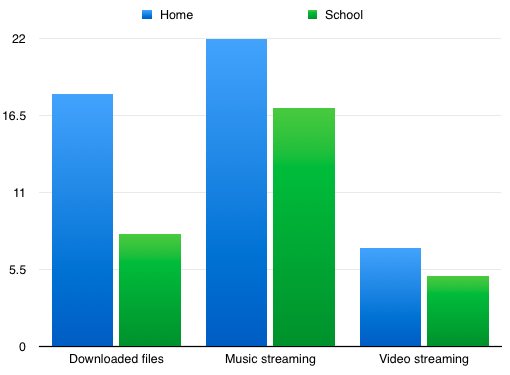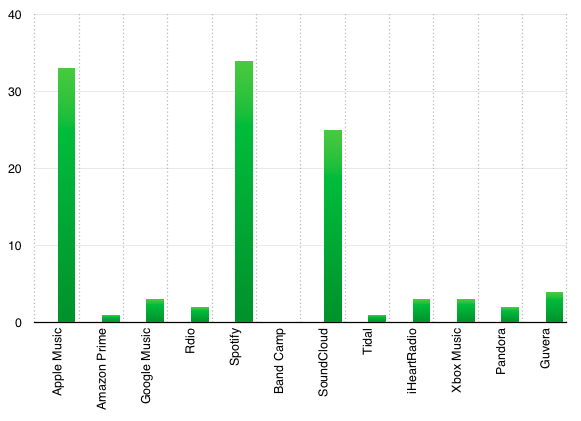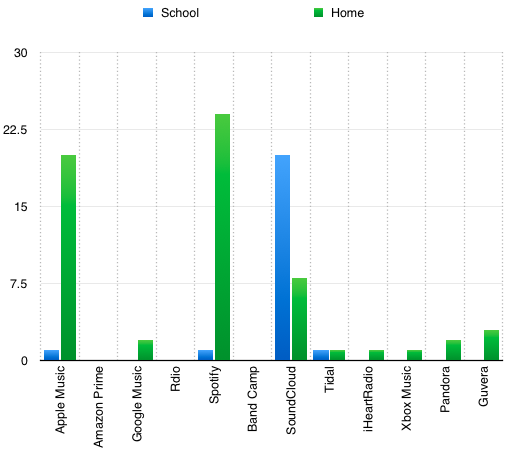I teach a lot of different students this year - the entire year 9 cohort, most of the year 7s and 8s (spread over the year), and a few classes of year 10s. Seeing all of them regularly gives me a pretty good look at how they use technology (with the exception of mobile since, like many schools, students are prohibited from using their phones during the day), which makes for some interesting conversations.
During last term I was thinking about streaming music services, partly because my Apple Music trial had run out and I was thinking about whether I listened to enough music to pay for it, and partly because students are usually pretty sneaky about getting what they want and so if their regular streaming sites are blocked (like YouTube or Spotify) they’ll keep looking until they find a replacement. This got me to thinking about whether the blocking of services by institutions like schools, universities and workplaces could contribute to the growth of companies that for some reason do not fall into the blocking black hole. Additionally, is that usage sticky enough that it could persist outside of the institution and translate into long term support for a service.
I figured music would be a good avenue to pursue here since there are so many streaming services, and all but a couple are blocked on the school network. The service which I focused on was SoundCloud, since it seems to be the one that is most popular with students when they can get away with it.
Since I have so many guinea pigs to ask about this sort of thing, I put together a quick survey to ask my year 9s about how they consumed music. The questions I put together were:
- Do you regularly listen to music?
Options for what sort of device is used (desktop/laptop, mobile device, non-cellular portable) - If you listen to music at school, what method do you use?
Options for downloaded files, streaming music, streaming video, no use - If you listen to music at home, what method do you use?
- Again, downloaded files, streaming music, streaming video, no use
- Select which streaming music services you have used
Options for all the main services I could find in Australia, plus an ‘other’ option - Which streaming music service do you use most at home?
Options for the previous list plus not listening at home - What is the main reason for using this service at home?
- Repeat of the last two questions in a school context
I got about 50 responses back, which isn’t bad considering I forgot to send the survey link to two of my classes since when I decided to do this I was also hounding them to get a project handed in and I was a little distracted in class.
The first thing I noticed once I started getting a significant number of responses back is that students don’t read questions (although to be honest, I learned that one in my first year of teaching). When asked to choose streaming music services (specifically mentioning this was audio and no video in the question), there were a significant number of responses which were streaming video 🙄.
Overall Usage
Unsurprisingly, the majority of students said that they mostly listened to music on their mobile phones. 82% of respondents used their mobile, 18% a non-cellular mobile device, and 12% on a laptop or tablet.
School Usage
Of the students who listened to music at school, 57% of them used some sort of streaming service, 27% used downloaded media, and 16% used a video streaming service.
Home Usage
Of the students who listened to music at home, 47% of them used some sort of music streaming service, 38% used downloaded media, and 15% used a video streaming service.

Music Consumption Methods
Streaming Services
When it comes to services which are being used, there was a surprising spread of services out there, although the fact that Apple Music and Spotify were the highest used services wasn’t too surprising. I suspect that the Apple Music figure is a bit inflated since I think some students might have (quite understandably) mistaken music being played throught he Music app with music being streamed.

Music Services Used
When looking at the most used music streaming services at home and at school in the chart below, there’s the bit of data which I’m mostly interested in. Eight respondents used SoundCloud in preference to other services at home. I’ll have to run another survey or two in the future to see how this changes.

Music Services Most Used
Most of this is pretty hand-wavey. Without looking at a wider range of ages at school and doing some longitudinal study to see how sticky some of these services are (which is made more difficult by the volatility of online business), there isn’t much point speculating as to what it means.
Anyway, just something for the giggles.